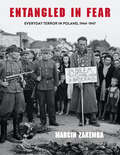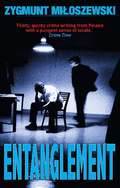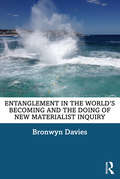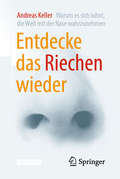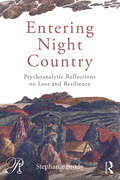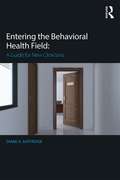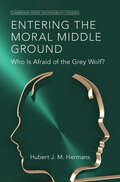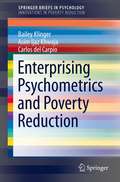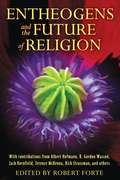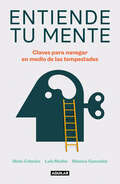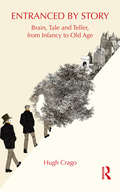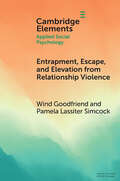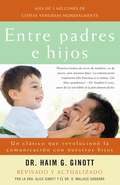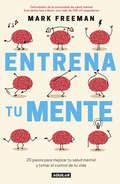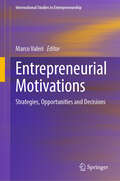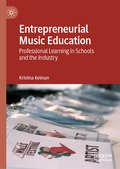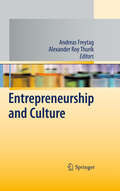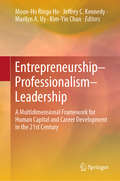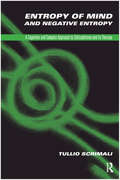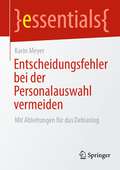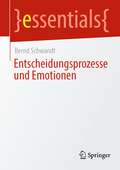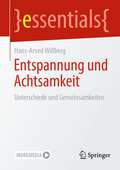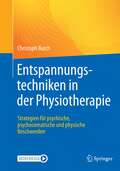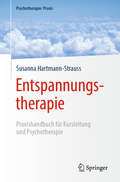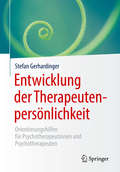- Table View
- List View
Entangled in Fear: Everyday Terror in Poland, 1944–1947
by Marcin Zaremba"Fear is always experienced individually, and few experiences are as personal. There can be no collective fear without individual fear preceding it. A society's fear is born out of the convergence of individual experiences, when dozens, hundreds, thousands, and millions of people are afraid of the same thing at the same time." This is a story about postwar Polish society and its emotions. This is a story of heroes: soldiers, deserters, orphans, and beggars. Now available in English for the first time, Entangled in Fear reveals the broken society where bandits, hunger, bombs, Russia, and countless other threats had an immense influence on Poles as they struggled through the wreckage caused by World War II. Journalist and historian Marcin Zaremba uses sociology, psychology, and history to explore collective fear in official documents and the personal papers of those who were left to survive in postwar Poland. In doing so, he reveals how fear of famine and epidemics, sexual violence and looting, joblessness and invasion led directly to collective action on the part of Poles. A groundbreaking work, Entangled in Fear challenges the reader to consider how emotions have shaped human history and how a more serious engagement with emotions is key to a fuller understanding of the past.
Entanglement
by Antonia Lloyd-Jones Zygmunt MiloszewskiPraise for Entanglement:"An exquisite contemporary crime story. Polish literature boasts a real master."--Jerzy Pilch, author of The Mighty Angel"A tightly plotted mystery novel, dark humor and contemporary Warsaw perfectly rendered."--Przekrój MagazineThe morning after a group psychotherapy session in a Warsaw monastery, Henry Talek is found dead, a roasting spit stuck in one eye.Public prosecutor Teodor Szacki, world-weary, suffering from bureaucratic exhaustion and marital ennui, feels that life has passed him by. But this case changes everything. Because of it he meets Monika Grzelka, a young journalist whose charms prove difficult to resist, and he discovers the frightening power of certain esoteric therapeutic methods. The shocking videos of the sessions lead him to an array of possible scenarios. Could one of the patients have become so absorbed by his therapy role-playing that he murdered Telak? Szacki's investigation leads him to an earlier murder, before the fall of Communism.And why is the Secret Police suddenly taking an interest in all this? As Szacki uncovers each piece of the puzzle, facts emerge that he'd be better off not knowing, for his own safety.Zygmunt Miloszewski, born in Warsaw in 1975, is an editor currently working for Newsweek. His first novel, The Intercom, was published in 2005 to high acclaim. Entanglement followed in 2007, and the author is now working on screenplays based on The Intercom and Entanglement as well as on a sequel to the latter, also featuring Teodor Szacki.
Entanglement in the World’s Becoming and the Doing of New Materialist Inquiry
by Bronwyn DaviesEntanglement in the World’s Becoming and the Doing of New Materialist Inquiry explores new materialist concepts and the ways in which they provoke an opening up of thought about being human, and about being more-than-human. The more-than-human refers, here, to the world that we are of – a world that includes humans, who are emergent and permeable, and all of the animal and earth others they intra-act with. It explores how we affect those others and are affected. This book engages intimately in encounters of various kinds, some drawn from the author’s everyday life, some from the research projects she has engaged in over several decades, and some from others’ research. It works at the interface of living- and writing-as-inquiry, delving into the rich seam of conceptual possibilities opened up by Deleuze and Guattari, and Barad, and by new materialist inquiry more broadly. It brings not just words to the task, but also art, photopraphs, movement, memories, bodies, sound, touch, things. It delves into the ways in which the entangled dynamics of social, material and semiotic flows and forces make up the diffractive movements through which life emerges, assembles itself, and endures. New materialist concepts, as they are explored here, offer new and emergent approaches to life itself, and to ways in which we might research our lives as they are intricately enfolded in the life of the earth.
Entdecke das Riechen wieder: Warum es sich lohnt, die Welt mit der Nase wahrzunehmen
by Andreas KellerWarum es sich lohnt, die Welt mit der Nase wahrzunehmenEntdecke das Riechen wieder riecht wie alle anderen Bücher, aber nachdem Sie es gelesen haben, werden Bücher und vieles andere für Sie nicht mehr so riechen wie zuvor. Ob es bei Menschen Pheromone gibt, warum es so schwierig ist, über Gerüche zu reden, welches Tier den besten Riecher hat und warum manche Menschen den Geruch von Spargel-Urin nicht riechen können - das sind nur einige der Fragen, die der Geruchsforscher Andreas Keller in diesem Buch beantwortet. Menschen besitzen eine gute Nase, haben aber im Laufe der Evolution mehr und mehr verlernt, sie zu benutzen. Dieses Buch wird Sie überzeugen, dass Riechen nicht so mysteriös ist, wie oft angenommen, und dass es sich lohnt, die Welt wieder (auch) mit der Nase wahrzunehmen. In einem Zeitalter, das von digitalisierten Erfahrungen geprägt ist, die beliebig kopiert und für die Ewigkeit gespeichert werden können, bedeutet die flüchtige Realität eines Geruches mehr als je zuvor.
Entering Night Country: Psychoanalytic Reflections on Loss and Resilience (Psychoanalysis in a New Key Book Series)
by Stephanie BrodyNone of us will escape the experience of personal loss, illness, aging, or mortality. Yet, psychoanalysis seems to shy away from a discussion of these core human experiences. Existential vulnerability is painful and we all avoid this awareness in different ways. However, when analysts fail to explore the topic of mortality, their own and their patients, they may foreclose an important exploration and short-change patient and therapist. Entering Night Country focuses on the existential condition, and explores how it penetrates professional lives, analytic work, and theoretical formulations. Each chapter explores this topic, shifting the lens from analytic process, to include theoretical assumptions, and professional communities. Stephanie Brody shows how the analytic process is a journey, no less profound than the epic journeys depicted in the classic literature of Homer and repeated in the patient’s own heroic and painful stories. Weaving literary references into the clinical experience of psychoanalysis, Brody reveals the transformative power of the analytic process for the patient and for the analyst. By relating the ancient past to our current struggles, psychoanalyst and patient together are guided to a destination, a life of meaning in the universe of possibilities. Clinical vignettes and personal reflections intersect with motifs from the epic poems and fantasy fiction, where the despair of loss and trauma do not extinguish the wish for change and the search for intimacy. Entering Night Country highlights the common themes that arise for patient and analyst as any person entering an unknown territory. It is intended for psychoanalysts, psychoanalytically oriented psychotherapists, and mental health clinicians. It will also be accessible to those outside the clinical profession, even to individuals who have little understanding of psychoanalysis.
Entering the Behavioral Health Field: A Guide for New Clinicians
by Diane SuffridgeThis text provides new clinicians with an overview of the tasks involved in behavioral health treatment as it is practiced in community-based training organizations. The text’s specific focus is on the application of theoretical and academic knowledge to clinical work as a psychotherapist or case manager, with a case example that follows treatment from the first session through termination. It contains an overview of all aspects of treatment that are required in these organizations, which are the primary settings for practicum, internship, and post-graduate training.
Entering the Moral Middle Ground: Who Is Afraid of the Grey Wolf? (Cambridge Series on Possibility Studies)
by Hubert J. HermansMany social and political groups consider each other as enemies rather than opponents with whom one can openly disagree. By introducing the concept of a moral middle ground, this book aims to overcome the perceived separation between good and bad, highlighting the possibility that human actions are permissible, understandable, and even valuable. To elucidate the nature of the moral middle ground and its psychological potentials, the author uses his theoretical framework, Dialogical Self Theory (DST). On the basis of these ideas, he portrays a variety of phenomena, including healthy selfishness, black humor, white lies, hypocrisy and the world views of some historical figures. He then demonstrates how the moral middle ground contributes to the development of a human and ecological identity. As a result, students and researchers in various disciplines, including psychology, literary studies, moral philosophy, political science, history, sociology, theology and cultural anthropology, will benefit from this book.
Enterprising Psychometrics and Poverty Reduction
by Carlos Del Carpio Bailey Klinger Asim Ijaz KhwajaThis book uses newly collected data with nearly 2000 observations across Africa and Latin America of SME owner/operators to examine if psychometric tools can distinguish the good ones from the bad ones. This book fully describes the development problem and how psychometric tools can help solve it. Moreover, it presents and develops the unique statistical methodologies to deploy psychometric tools for credit screening. This will be the single complete publication of the work to date by the entrepreneurial finance lab, created by Klinger & Khwaja. This work started as a research project at Harvard University's center for international development, with funding from Google.org. This work is very high profile, winning the G-20 SME Finance Challenge in 2010 (global open competition to identify the best scalable solutions to unlocking SME finance- winners honored at the G-20 summit in Seoul Korea and receiving significant funding from G-20 countries for the implementation of their models).
Entheogens and the Future of Religion
by Robert ForteA study of the importance of psychedelic plants and drugs in religion and society.
Entiende tu mente: Claves para navegar en medio de las tempestades
by Luis Muiño Molo Cebrián Mónica González¿Qué es el amor y cómo afecta a nuestro cuerpo y nuestra mente? ¿Cómo podemos gestionar el estrés? ¿Y la incertidumbre? ¿Podemos ser más asertivos en nuestra comunicación con los demás? ¿Cómo salimos de una relación tóxica? ¿Cómo podemos dejar de anticiparnos en negativo? El primer libro de Entiende tu mente, el podcast más escuchado en español. Si te fijas en la portada de este libro, verás una cabeza con una llave que cuando gira «hace clic». Tú eres quien decide qué hacer con ese clic, con esa frase que puede que te llame la atención en alguna de estas páginas. El mérito de tu progreso es tuyo. Aquí, simplemente, tienes unos aliados que disfrutarán mucho acompañándote en tu crecimiento personal y compartiendo reflexiones que tal vez -¡ojalá!- muevan esa llavecita que llevas en el cogote. Queremos animarte a que lo leas con la idea de que tienes en tu cartera el carné de nuestro club: el de las personas imperfectas. El club de la aceptación, donde aprendemos a querernos tal y como somos. Si te animas a entenderte mejor y a aceptar que eres una persona normal y del montón (no te imaginas la paz que da), lee este libro. Tenemos muchas esperanzas de que te proporcione, al menos, algunas ideas que prendan chispas y te permitan vislumbrar una forma distinta de salir de los líos mentales en los que andas atrapado. Nos gustaría que este libro te sirviera no solo para entender tu mente sino, también, para encender tu mente. El primer libro de Entiende tu mente, el pódcast más escuchado en español y número uno en psicología, es un camino de autodescubrimiento para aprender a vivir en el presente y a hablar más con nosotros mismos.
Entranced by Story: Brain, Tale and Teller, from Infancy to Old Age (Children's Literature and Culture)
by Hugh CragoWe live in a world of stories; yet few of us pause to ask what stories actually are, why we consume them so avidly, and what they do for story makers and their audiences. This book focuses on the experiences that good stories generate: feelings of purposeful involvement, elevation, temporary loss of self, vicarious emotion, and relief of tension. The author examines what drives writers to create stories and why readers fall under their spell; why some children grow up to be writers; and how the capacity for creating and comprehending stories develops from infancy right through into old age. Entranced by Story applies recent research on brain function to literary examples ranging from the Iliad and Wuthering Heights to Harold and the Purple Crayon, providing a groundbreaking exploration of the biological and neurological basis of the literary experience. Blending research, theory, and biographical anecdote, the author shows how it is the unique structure of the human brain, with its layering of sophisticated cognitive capacities upon archaic, emotion-driven functions, which best explains the mystery of story.
Entrapment, Escape, and Elevation from Relationship Violence (Elements in Applied Social Psychology)
by Wind Goodfriend Pamela Lassiter SimcockHow does experiencing intimate partner violence (IPV) affect one's identity, in terms of self-concept and self-esteem? In this Element, the authors propose a novel framework called the E3 Model in which relevant theory and research studies can be organized into three phases: Entrapment, Escape, and Elevation. Entrapment focuses on how people enter and commit to a relationship that later becomes abusive and how experiencing IPV affects the self. Escape explores how victims become survivors as they slowly build the resources needed to leave safely, including galvanizing self-esteem. Finally, Elevation centers on how survivors psychologically rebuild from their experience and become stronger, happier, more hopeful selves. This Element concludes with a discussion of applications of the E3 Model, such as public and legal policy regarding how to best help and support survivors.
Entre padres e hijos
by Dr. Haim GinottDurante los últimos treinta y cinco años, Entre padres e hijos ha permitido que millones de padres alrededor del mundo fortalezcan las relaciones con sus hijos. Escrito por el célebre psicólogo Dr. Haim Ginott, este libro revolucionario brinda consejos y enseñanzas para educar a los hijos de forma cariñosa y disciplinada a la vez. Con más de 5 millones de ejemplares vendidos mundialmente, esta guía clásica e indispensable ahora en una edición actualizada está repleta de lecciones que le enseñarán cómo: Disciplinar sin amenazas, sarcasmo, ni castigos Criticar sin degradar y elogiar sin juzgar Reconocer las emociones, opiniones e ideas de su hijo en vez de argumentar contra ellas Inculcar un sentido de responsabilidad en cada faceta de la vida de su hijo: desde las tareas del hogar y de la escuela hasta el cuidado de las mascotas y de hermanos menores
Entrena tu mente: 20 pasos para mejorar tu salud mental y tomar el control de tu vida
by Mark FreemanUn programa de ejercicios en el hogar para mejorar tu salud mental y tu estado físico. Es bien sabido que si queremos mantener nuestros cuerpos en forma, debemos realizar ejercicio de manera regular. Pero cuando se trata de nuestra salud mental, pocos nos tomamos el tiempo para mantenerla y mejorarla. Por alguna razón, esperamos estar en gran forma mental sin hacer ningún trabajo. Y cuando nos damos cuenta de que tenemos dificultades, buscamos una solución rápida y fácil en lugar de desarrollar las habilidades que nos ayudarán en el futuro. Entrena tu mente combina atención plena, terapia conductual cognitiva (TCC) y terapia de aceptación y compromiso (ACT), para delinear veinte pasos fáciles de seguir que puedes practicar para liberarte de las formas de pensar y comportarte que causan desafíos de salud mental en tu vida; desde eliminar las compulsiones que causan incertidumbre, ansiedad y angustia hasta aliviar el estrés y la distracción. El entrenamiento mental es la clave para pasar de una vida frenética y basada en la ansiedad a una que se basa en tus valores fundamentales. Te hará sentir mentalmente más fuerte, más en forma y mejor equipado para navegar por las complejidades de la vida cotidiana.
Entrepreneurial Motivations: Strategies, Opportunities and Decisions (International Studies in Entrepreneurship #57)
by Marco ValeriEntrepreneurship depends on the decisions that people make about how to undertake that process; however, in recent years, entrepreneurship research has focused largely on the environmental characteristics influencing firm founding and the characteristics of entrepreneurial opportunities, ignoring the role of human agency. This book, therefore, focuses on how human motivations influence the entrepreneurial process. It argues that the attributes of people making decisions about the entrepreneurial process influence the decisions that they make. The book particularly investigates whether entrepreneurial role models, social valuation of entrepreneurship, perceived knowledge of entrepreneurial support and barriers to starting a business, entrepreneurial intention, and its determinants are related to entrepreneurial motivation.Featuring case studies that analyze the motivations that researchers have suggested should influence the entrepreneurial process, this book is beneficial to students, scholars, and practitioners in entrepreneurship.
Entrepreneurial Music Education: Professional Learning in Schools and the Industry
by Kristina KelmanThis book addresses the gap between formal music education curricula and the knowledge and skills necessary to enter the professional music industry. It uses extensive data from a long-running research project where high school students were invited to start their own business venture, Youth Music Industries. Not only did this act as a business venture, but it also functioned as a learning environment informed by the concepts of Communities of Practice and social capital. Exploring how entrepreneurial qualities were developed, their learning was subsequently captured and distilled into a set of design principles: in this way, a pedagogical approach was developed that can be transferred across the creative industries more broadly. This book will be of interest and value to scholars of music education, as well as those preparing students for the creative industries.
Entrepreneurship and Culture
by Roy Thurik Andreas FreytagThe book is an innovative compilation of papers that explore the relationship between cultural features and entrepreneurship. The relative stability of differences in entrepreneurial activity across countries suggests that other than economic factors are at play. The contributions to this edited volume deal with the foundations of entrepreneurship and with the effects of different cultural settings on the incidence and success of entrepreneurs. Topics are individual decision making in a cultural context, regional aspects of entrepreneurship, cross-country differences, and the influence of culture on entrepreneurial activity.
Entrepreneurship–Professionalism–Leadership: A Multidimensional Framework for Human Capital and Career Development in the 21st Century
by Moon‐Ho Ringo Ho Jeffrey C. Kennedy Marilyn A. Uy Kim-Yin ChanThis book updates the theory and brings together empirical research based on the multidimensional entrepreneurship–professionalism–leadership (EPL) framework for subjective career ‘space’. It also discusses the extension of the original ‘person-centred’ framework to other levels of analysis, for example, ways of considering the EPL (human capital) capacities of an organisation, city, or even nation.By providing insights into the development of EPL motivations and efficacies over time, the book helps readers appreciate the application of the EPL framework in a wider range of contexts, such as research–innovation–enterprise, healthcare, and pre‐university settings. It also shows how EPL research contributes to a better understanding of leadership and entrepreneurial development.
Entropy of Mind and Negative Entropy: A Cognitive and Complex Approach to Schizophrenia and its Therapy
by Tullio ScrimaliSchizophrenia is the central problem in the sciences of the mind, not only for its etiological, psychopathological and clinical aspects, but also because of its implications for therapy and rehabilitation. In this volume the author describes a series of new scientific and clinical perspectives for schizophrenia influenced by cognitivist and constructivist approaches and informed by the logic of complexity and non-linear, dynamic systems. The author delineates a new complex theory of the brain and a procedural theory of the mind, founded on the concept of the modular brain and the coalitional mind. Subsequently, the author develops a multi-factorial conceptualization of the etiological dynamic and an original, complex, and evolutionary perspective concerning the psychotic condition, which has been redefined, in this case, as Entropy of the Mind or Phrenentropy. In conclusion, the author illustrates an innovative, integrated protocol, denominated Negative Entropy, for the treatment and rehabilitation of patients with schizophrenia.
Entscheidungsfehler bei der Personalauswahl vermeiden: Mit Ableitungen für das Debiasing (essentials)
by Karin MeyerDieses Werk zeigt Ihnen, wie es zu Entscheidungsfehlern bei der Personalauswahl kommt und wie diese präventiv verhindert werden können. Denn: Fast ein Viertel der getroffenen Personalentscheidungen werden innerhalb der ersten zwei Jahre entweder durch das Unternehmen oder den Mitarbeitenden korrigiert. Hinzukommen Personaleinstellungen, die aus Gründen der Kontinuität beibehalten werden, sich jedoch als unbefriedigend erweisen. Im Extremfall werden damit fast 40 Prozent aller Vakanzen mit einer Person besetzt, die für die zu erfüllende Aufgabe nicht oder nicht optimal geeignet ist – mit entsprechenden Konsequenzen für Teams und Unternehmen. Wenn Sie derartige Entscheidungsfehler verstehen und vermeiden möchten, ist dieses Werk eine ideale Lektüre.
Entscheidungsprozesse und Emotionen (essentials)
by Bernd SchwandtIn diesem Essential wird das Zusammenspiel von Emotionen und kognitiven Prozessen bei Entscheidungen dargestellt. Grundlage dafür bildet das Modell der vier kognitiven Systeme der Motivation in der PSI-Theorie von Julius Kuhl. Dabei geht es um die Wechselwirkungen von Gefühlen und Denkprozessen. Gefühle werden dabei als Form von automatisierter Informationsverarbeitung und als notwendiges Steuerungssystem für kognitive Prozesse verstanden.Im zweiten Teil werden Konzept und Grundannahmen des Züricher Ressourcen Modells (ZRM) vorgestellt, ein ressourcenorientiertes und neurobiologisch begründetes Trainingskonzept zum Selbstmanagement, das (u.a.) die Theorie von Kuhl praktisch umsetzt. Sie erfahren dabei, welche Möglichkeiten es gibt, ein Ziel in seinem Weg vom Bedürfnis bis zur automatisierten Handlung zu begleiten.
Entspannung und Achtsamkeit: Unterschiede und Gemeinsamkeiten (essentials)
by Hans-Arved WillbergOhne Entspannung gibt es keine Achtsamkeit, aber Achtsamkeit ist mehr als Entspannung. Wenn ich mich darauf besinne, achtsam zu sein, komme ich zur Ruhe. Wenn ich zur Ruhe komme, entspanne ich. Die Ruhe der Achtsamkeit gleicht aber der Sehne des Bogens, die nie ganz ohne Spannung bleibt und stets zur Verfügung steht, um sich bis zum Äußersten anzuspannen. Reine Entspannung kann uns schläfrig werden lassen, aber im Zustand der Achtsamkeit sind die Sinne wach. Reine Entspannung kann uns zur Erholung führen, Achtsamkeit ist gesammelte Tatbereitschaft. Das Buch zeigt auf, was Entspannung und Achtsamkeit eint und unterscheidet. Es weist Lehrenden und Anwendern den Weg, beides einzuüben. Dazu dienen besonders auch die beigefügten Audio-Instruktionen.
Entspannungstechniken in der Physiotherapie: Strategien für psychische, psychosomatische und physische Beschwerden
by Christoph BurchDieses Praxisbuch liefert Physiotherapeuten eine Vielzahl an evidenzbasierten Entspannungstechniken. Sie wollten schon immer wissen, wie Embodiment wirkt? Welche Entspannungstherapien können die Behandlung eines Tinnitus aurium unterstützen? Und welchen Stellenwert hat Schlaf in unserem täglichen Leben? Hier finden Sie die Antworten!Aus dem Inhalt:• Grundlagenwissen zu Stressreaktionen und Entspannungstherapie• Konkrete Entspannungsmethoden wie z. B. Progressive Relaxation, Biofeedback und Achtsamkeit• Anwendung bei spezifischen psychischen, psychosomatischen und physischen BeschwerdebildernPlus: Videos veranschaulichen die praktische Umsetzung optimal!Erweitern Sie Ihr Wissen und verhelfen Sie sich und Ihren Patienten zu einem besseren Behandlungsergebnis!
Entspannungstherapie: Praxishandbuch für Kursleitung und Psychotherapie (Psychotherapie: Praxis)
by Susanna Hartmann-StraussDieses Buch bietet eine praxisorientierte Hilfe zur Gestaltung von Entspannungskursen und Einzelsitzungen. Die beiden verbreitetsten Verfahren, Progressive Relaxation und Autogenes Training, werden so umfassend dargestellt, dass das Handbuch als praktischer Kursleitfaden dienen kann. Im Mittelpunkt steht jedoch nicht die Methode, sondern Aufbau, Ablauf und Gestaltung der Kurssituation sowie das nötige psychologische und entspannungsspezifische Wissen. Die Kenntnisse lassen sich auf andere Verfahren, wie bspw. Imagination oder Achtsamkeit, ebenso anwenden. Neben dem psychotherapeutischen Einsatz in Praxis und Klinik ist das Werk auch für die Anwendung in der Prävention geeignet. Es erläutert die Unterschiede in den verschiedenen Kontexten ebenso wie Strategien bei speziellen Zielgruppen und Themen (z. B. bei Schmerzpatienten und Schlafstörungen). Aus dem Inhalt: Zielgruppenorientierte Erklärungen – Übungsanleitungen und Vorgehensweisen – konkrete Umsetzung im Kurs – entspannungsspezifisches Wissen und psychologische Grundlagen – Motivationsaufbau und Transfer in den Alltag – Umgang mit Problemen und Störungen im Kursverlauf. Die Autorin: Susanna Hartmann-Strauss ist Diplompsychologin, Psychologische Psychotherapeutin, Systemische Therapeutin und Supervisorin. Sie arbeitet kassenzugelassen in eigener Praxis und bildet seit mehr als 15 Jahren Entspannungstrainer in präventiven und therapeutischen Kontexten aus.
Entwicklung der Therapeutenpersönlichkeit: Orientierungshilfen für Psychotherapeutinnen und Psychotherapeuten
by Stefan GerhardingerDie Entwicklung der Therapeutenpersönlichkeit ist kein Vorgang, der mit einer klassischen Berufsausbildung, einer Qualifizierungsmaßnahme, Weiter- oder Fortbildung im herkömmlichen Sinne verglichen werden kann. Insbesondere diejenigen, die in ihrem Werdegang an der Überlegensschwelle stehen, in den Psychotherapieberuf zu gehen, ganz besonders aber die in der Ausbildung befindlichen Psychotherapeut*innen und zeitlich folgend die frisch praktizierenden Psychotherapeut*innen benötigen Orientierung, was der Therapieberuf ihnen neben aller Technik abverlangt, aber auch geben kann.Dieses erzählerische Lehrbuch ist ein immer wieder hilfreicher Leitfaden, um eine Passung zwischen therapeutischer Tätigkeit und privat-persönlichem Rollenverständnis zu begünstigen. Die Entwicklung der Therapeutenpersönlichkeit kann keinesfalls in einer stringenten Kaskade von abzuarbeitenden Schritten beschrieben werden, vielmehr verstehen sich die einzelnen Kapitel dieses Buches als Inspiration, Nudges, Guidelines, Einladungen zur Selbstreflexion und Selbsterfahrung. Selbstredend werden allgemeingültige Standards beschrieben, darüber hinaus aber wird eine anregende Vielfalt aufgespannt, die im Rahmen unabdingbar maßgeblicher technisch-struktureller Aspekte eine persönliche Zielfindung und bewusste Entwicklung zu einem guten Therapeuten bzw. einer guten Therapeutin begünstigt. Die Entwicklung der Therapeutenpersönlichkeit wird immer ein überaus individueller Ablauf bleiben, zu dem dieses Buch Struktur und Inspiration gibt.
